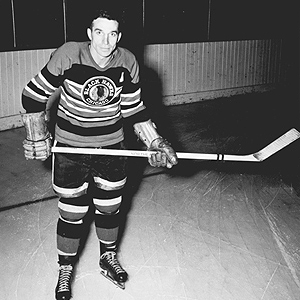
The debate between whether Doug or Max Bentley was the better player is surely a storied one, especially amongst themselves. Doug, Max’s senior by four years, joined the Chicago Black Hawks in the 1939-40 season, playing a relatively minor role, but scoring 12 goals in 39 games. Doug’s success was somewhat unprecedented as incredibly, he was even smaller than his younger brother. Doug stood at just 5’8″ and tipped the scales at 145 lbs, making him one of the lightest players in NHL history.
Doug was joined by Max in the 1940-41 season, though neither tore the league up early on. Doug was known for his speed and became one of the most exciting players to watch. Not only did he use his speed for offensive purposes, but he was willing to speed back down the ice to make a good defensive play. Both brothers slowly improved and in the 1941-42 season, Doug scored a hat-trick with his brother assisting on all three goals.
Despite their moderate success, it was the 1942-43 season in which Doug really broke out. Recently named the team captain, he played in all 50 games and scored a league-leading 33 goals and a league-leading 73 points. Despite his performance, the Black Hawks missed the playoffs. Still, Doug was recognized by finishing 2nd in the voting for the Hart trophy and earning a spot on the First All-Star Team. It was in that season that Doug also managed a six-point game, a rare feat.
Doug continued his dominance in the 1943-44 season by leading the NHL with 38 goals and finishing second in points with 77 points. Bentley finished third in Hart voting at the end of the season. Doug, a Saskatchewan-raised kid, had to take an unexpected year off in the 1944-45 season when he was locked into Canada for the war and not allowed to leave. As a result of Doug’s absence, Chicago picked a new captain and Maurice Richard took over the title of premier scorer in the NHL and had set a new precedent for scoring in the NHL.
Doug played well in his return to the NHL, but was injured, playing in just 36 games but still scoring 40 points. Doug excelled again in the 1947-48 season, even through the trade of his brother Max to Toronto. Doug changed his style to more of a play-making forward and led the NHL with 37 assists and finished third in points with 57 point in 60 games. Doug continued to dominate the NHL in the 1948-49 along with teammate Roy Conacher. Doug finished first in assists again with 43 assists and finished second in points with 66. Doug was on the Second All-Star Team and finished 4th in Hart trophy voting.
Moving to the 70-game NHL in 1949-50, Doug was re-named the team captain and played in 64 games and tallied 53 points, a note-worthy drop of his previous season. Despite this, Doug still finished 7th in the NHL in points and actually had a higher points-per-game than his teammate Roy Conacher, who finished one place above him in the standings. Doug was replaced as team captain and his goal-scoring took a hard hit in the 1950-51 season. While he did play in just 44 games, the 9 goals he scored was still a worrisome sign for the now 34-year old. Doug played in just 8 games during the 1951-52 season before taking off to the WHL’s Saksatoon Quakers and eventually playing one final season with his brother Max for the New York Rangers in the 1953-54 season, scoring 12 points in 20 games. Doug then retired from the NHL at the age of 37 but he continued to play in the WHL for two more seasons and then on and off before retiring for good in 1962 in his mid 40s.
While Doug’s brother Max had a longer career, Doug was generally considered the better player in terms of his overall offense and defensive play. Doug finished with just one point less than Max in 80 less games. Doug was also voted the best Chicago Black Hawk player in the first half-century of the 1900s in 1950. Doug retired at 4th all-time in NHL assists with 324 assists and was first in both assists and points among Chicago Black Hawks. Bill Mosienko would play one more season in Chicago and pass Doug in the points category, but his assist record wasn’t surpassed until both Bobby Hull and Pierre Pilote did it in the 1965-66 season. Doug was inducted into the Hockey Hall of Fame in 1964, two years before his brother Max was.